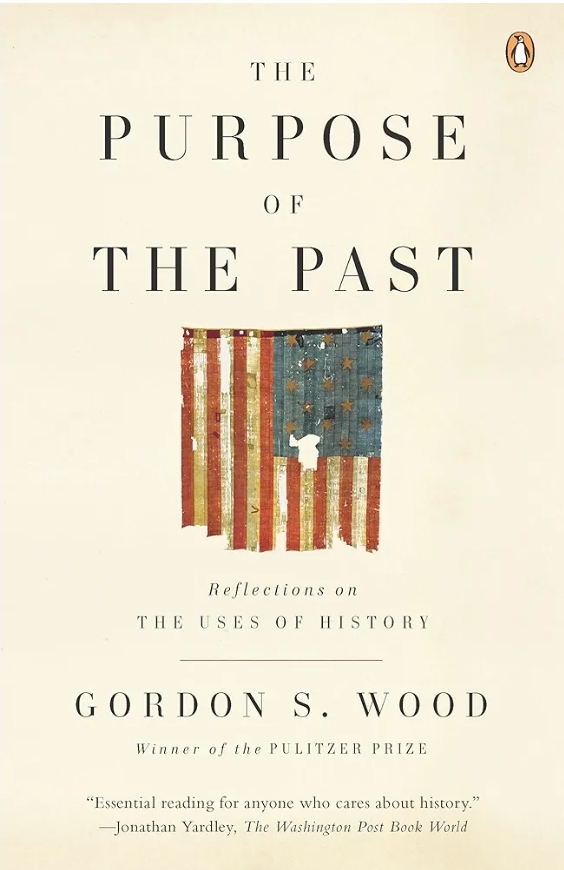Gordon S. Wood’s The Purpose of the Past: Reflections on the Uses of History is a collection of essays that delve into the role and significance of history in understanding contemporary society. In this work, Wood, a distinguished historian, reflects on the evolving nature of historical scholarship, the methods historians use to interpret the past, and the ways in which history can inform public life and national identity.
Key Themes and Concepts:
The Role of Historians and Historical Interpretation: Wood begins by discussing the role of historians in shaping how the past is understood. He emphasizes that historians are not just recorders of facts but interpreters who construct narratives based on evidence. Wood examines how different historical interpretations reflect the values and concerns of the time in which they are written, arguing that history is always a dialogue between the past and the present.
History as a Discipline of Reflection: A key argument in Wood’s essays is that history provides a mirror for society, offering a way to reflect on contemporary issues by examining how similar issues were addressed in the past. Wood advocates for a measured and careful use of history, warning against using the past to justify current political or ideological agendas. He emphasizes the importance of understanding history in its own context rather than projecting modern values onto historical events.
Revisionist History: Wood explores the concept of revisionist history, where historians reexamine and reinterpret past events, often challenging established narratives. He acknowledges that revisionism is a necessary part of historical scholarship, as new evidence or perspectives can shed light on previously overlooked aspects of history. However, he also cautions that revisionism can sometimes be driven by political motives, leading to distorted interpretations of the past.
The Influence of Postmodernism on History: Wood addresses the impact of postmodernism on the field of history, particularly the idea that there is no objective truth, only competing narratives. While he recognizes the value of questioning traditional historical narratives, Wood argues that historians must still strive for accuracy and truthfulness in their work. He warns against the dangers of relativism, where all interpretations are seen as equally valid, regardless of their basis in evidence.
The Use of History in Public Life: One of the central themes of the book is the use of history in public discourse. Wood discusses how history is often invoked in political debates and public policy discussions, sometimes in ways that oversimplify or distort the past. He urges historians to engage with the public and contribute to discussions about national identity and values, but to do so in a way that is faithful to the complexity of the historical record.
History as a Moral Guide: Wood explores the idea that history can serve as a moral guide, helping societies learn from past mistakes and successes. However, he is careful to point out that history does not provide clear-cut lessons or solutions. Instead, it offers insights and perspectives that can inform decision-making in the present. Wood argues that the study of history encourages humility and tolerance, as it reveals the complexity of human behavior and the unintended consequences of even well-intentioned actions.
The Tension Between Popular and Academic History: Wood examines the divide between popular history—history written for a general audience—and academic history, which is often more specialized and theoretical. He believes that both forms of history are important, but he critiques academic historians who write in obscure, jargon-filled language that alienates the public. Wood advocates for a middle ground, where historians write with rigor and clarity, making their work accessible to both scholars and the general public.
The Value of Historical Knowledge: Throughout the book, Wood emphasizes the inherent value of historical knowledge. He argues that history helps individuals and societies understand their identity and place in the world. By studying the past, people can gain a deeper appreciation for the complexities of the present and the contingencies that have shaped their lives. Wood views history as essential to fostering a sense of continuity and purpose in a rapidly changing world.
Conclusion:
The Purpose of the Past: Reflections on the Uses of History is a thoughtful exploration of the role that history plays in shaping our understanding of the world and ourselves. Gordon S. Wood’s essays encourage readers to reflect on the ways in which history is used, interpreted, and sometimes misused in both academic and public spheres. He advocates for a balanced approach to history that respects the complexities of the past while remaining relevant to contemporary issues. This book is an important contribution to discussions about the purpose and value of historical scholarship, and it offers valuable insights for anyone interested in the relationship between history and society.







